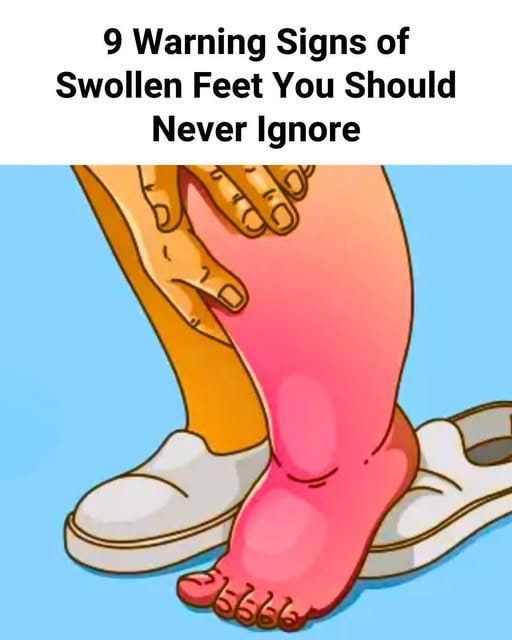
Have you ever put on your favorite shoes only to find they’re suddenly too tight? Swollen feet can be really uncomfortable, making simple things like walking a struggle. Swelling can be caused by minor things, but it can also signal an underlying health problem. Knowing the causes and when to see a doctor can greatly affect your well – being.
What Causes Swollen Feet?
Your body works against gravity to circulate blood and fluids. When this process is disrupted, fluid can build up in the feet, ankles, and legs, a condition called edema. Occasional swelling may not be a big deal, but persistent or painful swelling could be serious.
Let’s look at 10 common causes of swollen feet and when to see a doctor.
- Standing or Sitting for Too Long
If you stand all day or sit for long periods, your feet may swell. Gravity makes fluids pool in your lower body.- How to Reduce Swelling:
- Elevate your feet at the end of the day.
- Wear compression socks.
- Take breaks to stretch or move around.
- When to See a Doctor: If swelling doesn’t go away after rest or affects one foot more than the other.
- How to Reduce Swelling:
- Excessive Salt Intake
Love salty snacks like chips, fries, or canned soups? Too much sodium makes your body hold water, swelling your feet and ankles.- Ways to Reduce Sodium Intake:
- Check food labels and choose low – sodium options.
- Eat more potassium – rich foods (bananas, spinach, avocados).
- Drink enough water to flush out extra salt.
- When to See a Doctor: If swelling persists despite lifestyle changes, as it could be a kidney or heart problem.
- Ways to Reduce Sodium Intake:
- Injuries and Inflammation
A twisted ankle, fracture, or tendonitis can cause swelling from inflammation. The main difference? Pain.- Treatment for Injury – Related Swelling:
- Rest and don’t put weight on the affected foot.
- Apply ice packs to reduce inflammation.
- Use compression bandages for support.
- When to See a Doctor: If swelling gets worse or doesn’t improve in a few days.
- Treatment for Injury – Related Swelling:
- Pregnancy
Pregnant women often have swollen feet due to more fluid retention, weight gain, and blood vessel pressure.- Tips to Reduce Swelling During Pregnancy:
- Avoid standing for long.
- Wear comfy shoes and avoid tight socks.
- Stay hydrated and elevate your feet.
- When to See a Doctor: If swelling is sudden, severe, or with high blood pressure, as it could be preeclampsia.
- Tips to Reduce Swelling During Pregnancy:
- Premenstrual Syndrome (PMS)
Hormonal changes before your period can cause bloating and fluid retention, swelling your feet.- How to Manage PMS Swelling:
- Cut down on salt and processed foods.
- Stay active and drink plenty of water.
- Consider magnesium supplements to balance fluid levels.
- When to See a Doctor: If swelling lasts longer than your menstrual cycle or gets worse over time.
- How to Manage PMS Swelling:
- Excess Body Weight
Carrying extra weight puts more pressure on your feet and blood vessels, leading to swelling.- Ways to Reduce Swelling from Extra Weight:
- Do low – impact exercises like swimming or cycling.
- Eat a healthy diet to support weight loss.
- Elevate your feet now and then.
- Ways to Reduce Swelling from Extra Weight:
- Medication Side Effects
Some meds can cause fluid retention, like:- Blood pressure meds
- Steroids
- Antidepressants
- Diabetes meds
- What You Can Do:
- Talk to your doctor about other meds.
- Move more and stay hydrated.
- Wear compression socks to stop fluid buildup.
- Caution: Never stop a prescribed med without talking to your doctor first.
- Varicose Veins
Varicose veins happen when veins weaken and can’t push blood back to the heart. Blood pools in the legs and feet, causing swelling.- How to Manage Varicose Veins:
- Exercise regularly to improve circulation.
- Elevate your legs when sitting or lying down.
- Wear compression socks.
- When to See a Doctor: If swelling gets worse or is painful.
- How to Manage Varicose Veins:
- Blood Clots (Deep Vein Thrombosis – DVT)
A blood clot in your leg can block circulation, causing one – sided swelling, pain, and redness. Deep vein thrombosis (DVT) can be life – threatening if the clot reaches your lungs.- Seek Medical Help Immediately If:
- You have pain and tenderness in one leg.
- The swollen area feels warm.
- You have shortness of breath or chest pain.
- Seek Medical Help Immediately If:
- Heart, Liver, or Kidney Disease
Swelling in the feet can be an early sign of organ problems:- Heart failure can cause fluid retention from poor circulation.
- Kidney disease reduces the body’s ability to get rid of extra fluids.
- Liver disease leads to low protein levels, causing fluid buildup.
- When to See a Doctor:
- Swelling doesn’t go away after rest.
- It affects both feet and gets worse over time.
- You have symptoms like shortness of breath, fatigue, or nausea.
Final Thoughts: Don’t Ignore Persistent Swelling
Swollen feet can be a minor annoyance or a big warning sign. If you notice persistent swelling, pain, or other worrying symptoms, don’t ignore them. While occasional swelling from standing, salty foods, or PMS is normal, ongoing or severe swelling could mean a deeper health issue. When in doubt, listen to your body and see a doctor. Your feet might be trying to tell you something important!